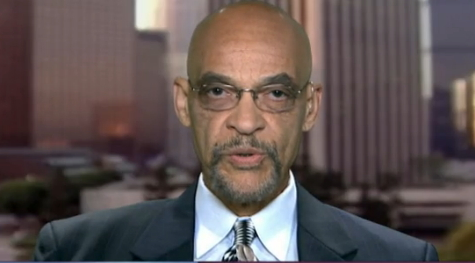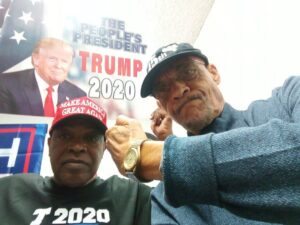Earl Ofari Hutchinson
Disbelief, shock, laughter, disgust, and propaganda were some of the more charitable reactions of Blacks to the September 2023 Quinnipiac Poll that found that twenty percent of Blacks backed Trump. Earlier polls showed some variability in Black support for Trump. Overall, though, there was a measurable uptick in Black support in the polls.
Trump as usual grossly exaggerated the increase in Black support claiming that he had “quadrupled’ his support among Blacks. He piled on the patently false claim by attributing it to the release of his mug shot after his indictment and surrender in the Georgia vote scam case.
Trump’s patented lies about Black support aside, there are three undeniable facts in the polls. One is that a lot of Blacks do like Trump. Another is that Trump marginally bumped up his Black vote total in his losing 2020 presidential reelection bid over the number GOP presidential candidates routinely get from Blacks. Yet another is that this marked increase in Black support for Trump if it holds up spells even more trouble for Biden and the Democrats if Trump bags the GOP 2024 presidential nomination—which the betting odds are that he will.
The first warning sign that a not insubstantial number of Blacks backed Trump came in his 2016 presidential win over Hillary Clinton. He netted about eight percent of the overall Black vote. That had some significance for the election. It factored out to roughly a half million votes. That topped the total of Black votes that GOP presidential contenders Romney in 2012 and McCain in 2008 got. Another four percent of Black voters did not support Clinton. Together that amounted to over one million Black votes lost to Clinton. That should have set off the alarm bells. At the time, many observers blamed the drop off on either an uninspiring effort by Clinton to rev up Black voters, or simply the usual charge that Democrats take the Black vote for granted. This time it backfired, and a lot of Blacks just simply opted to stay home on Election Day.
However, the brutal reality was that thousands of Blacks did vote for Trump. They did again in 2020. Their reasons were easy to explain. Trump touched a tiny nerve with his shout that poor, underserved Black neighborhoods are supposedly a mess with lousy public schools, high crime and violence, and chronic joblessness and poverty.
He dumped the blame for that squarely on the Democrats who run and have run most of these cities for decades. Trump doubled down on that slam with a handful of carefully choreographed appearances with high-profile Black preachers, at name Black churches. That was just enough to take the hard and sharp edge for some Blacks off the almost-set-in-stone image of Trump as a guy with a white sheet under his suit.
There was more. As far back as the 2004 presidential election, there was a sign that more than a few Blacks, most notably Black conservative evangelicals, were deeply susceptible to GOP conservative pitches on some issues. A considerable number of them voted for Bush Jr. that year and that was enough to give him the cushion he needed to bag Ohio and win the White House. The same polls that election that showed black’s prime concern was with bread-and-butter issues–and that Bush’s rival Democrat rival John Kerry was viewed as the candidate who could deliver on those issues–also revealed that a sizable number of Blacks ranked abortion, gay marriage, and school prayer as priority issues. Their concern for these issues didn’t come anywhere close to that of white evangelicals, but it was still higher than that of the general voting public.
In presidential elections in 2008 and 2012, 2016 and 2020, Black GOP advocacy groups ran ads hammering the Democrats again for their alleged indifference to and outright aid and abet of Black suffering in the inner cities, and touting the GOP’s emphasis on small business, school choice, and family values as the best path to Black advancement.
This pitch has always had some appeal to many Blacks. Though it will never trigger any kind of stampede to the GOP by even most of these conservative-leaning Blacks, it was enough to take some of the sting out of the GOP’s naked history of racial abuse.
Trump understood enough of that history. He tailored the few pitches he made to Blacks for their votes in 2016 and 2020 to reflect the stock GOP pro-business, free enterprise, and the healthy economy line as something that Blacks also could and should embrace.
None of this should be construed as a sign that Trump has remade himself into a racially sensitive, compassionate potential GOP White House occupant again. Trump will stay true to form and race bait whenever it suits his purpose in 2024. But that likely won’t prevent more than a few Blacks from buying his pitch that an indicted, polarizing, GOP presidential candidate with a horrific tainted racial history, is a better bet in the Oval Office than Biden or any other Democrats. This makes the one out of five Blacks who back him no fluke.
Earl Ofari Hutchinson is an author and political analyst. His latest book is Why the GOP Became a White Supremacist Party (Middle Passage Press). He also is the host of the weekly Earl Ofari Hutchinson Show on the Pacifica Radio Network. He is the publisher of thehutchinsonreport.net

